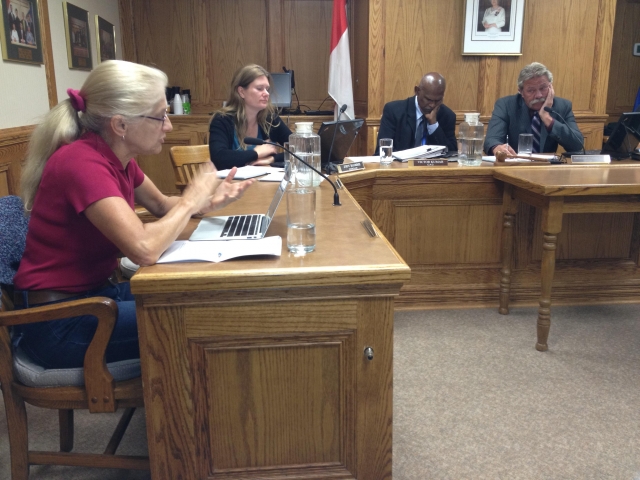What will Columbia-Washington cost taxpayers? Still no answers for Coun. Moore
Coun. Kathy Moore has asked since July for an update on the estimated cost to Rossland taxpayers for the downtown renovation, but neither those estimates nor an explanation of how the expenses will be financed were provided at the Sept. 17 regular council meeting.
Assuming short term borrowing and using confidential cost reports that council receives from ISL Engineering, Moore said she has calculated a higher cost to the taxpayer than was previously expected, and she wants city staff to report back on expected costs now that the project is nearing completion.
“I am disappointed we still don’t have an update on the estimated cost to taxpayers for Columbia-Washington,” Moore began during Members’ Reports. “But I had an idea: we could do a contest. We could have the citizens guess how much it’s going to cost. That would get some interest.”
“The contest is a joke,” she clarified. “But not telling the citizens what this is going to cost, that is not a joke. After all, the citizens are paying the bill.”
“Last meeting I was told this would happen, and it still hasn’t,” she said. “We had the spreadsheet [of estimated cost to taxpayers] in December at a public meeting. It was updated in May at a public meeting. I asked for it [again] in July. Now is the time.”
In fact, Moore has asked at every council meeting since July, but has yet to receive an answer from the mayor or city staff.
Short term or long term borrowing?
Moore became persistent when, in August, she discovered that the long term $6 million borrowing limit from the December 2010 Alternative Approval Process (AAP) was not to be used. So far, no reason for why the AAP won’t be used has been made public.
The AAP is a way for municipalities to ascertain public support to finance a project. An AAP fails and borrowing may not proceed if, over the period of a month, more than 10 per cent of the voting population comes to City Hall to vote against the financing. Otherwise, the AAP allows the project to borrow up to the stated limit.
At the Aug. 13 regular council meeting, Moore said, “The [Communication Task Force] reports have been great, they’re really informative, and I really applaud the group for that. But there’s one piece I’d really like to see: the overview, the big picture.”
She asked, “It would be nice to update the public on our plan for financing. I know we had the Alternative Approval Process in December 2010, when we got the approval for borrowing $6 million. At that time we were thinking that we weren’t going to really have to do that, because [of possible grants].”
“But now that we don’t have the grants, I’d like to see another summary of how that long term borrowing is going to look,” she said. “We haven’t had that updated for a while, and I think that’s important.”
Mayor Greg Granstrom replied to Moore, “On the AAP: we’re not using that at this time.”
This came as a surprise to Moore and others who had assumed that the $6 million limit on long term, low interest borrowing was how the Columbia-Washington project was to be funded.
Granstrom continued, “And the update on financing: we can’t really do it until we have an update on the project itself.”
CAO Victor Kumar added, “It has not changed.”
Moore sought clarification, “So we’re not doing long term [25 year] borrowing at this time? So short term [five year] borrowing?”
The mayor replied, “No [long term borrowing.] That was in a report.”
$72 more per year per household, $170, or more?
At the Sept. 4 council meeting, Moore looked for an answer again.
She said, “I feel quite strongly that we need to give an update to the citizens about the cost of Columbia-Washington.”
“We had a report from staff in December that it was going to cost $72 per average household [roughly $260,000 assessed value] over five years. And then in May the estimate was up to $170,” she said, assuming short term borrowing.
“Doing some calculations myself, the number is a fair amount higher,” she concluded, “So I would really appreciate it if staff could give us a report on that at the Sept. 17 meeting, just updating the spreadsheet that Mr. Kumar had on the way.”
“We have quite complete cost estimates from the contractor,” she said, explaining the source of her calculations.
The mayor replied, “At this time, council gets those schedules from the contractor, and they remain confidential for a reason. If you wish to discuss this further, we’ll have to go in camera.”
“Not the details,” Moore explained, “the details can remain confidential. But the overall cost to the taxpayer should not be [confidential].”
Granstrom responded, “We don’t have that cost.”
Moore clarified, “I’m asking for the report Mr. Kumar gave in December and then in May on what it would cost the average taxpayer, per year, for five years—assuming we’re not doing long term borrowing. Those were both in public meetings. That’s public information.”
“I understand that,” Granstrom said. “When we have an update, we can give an update. We don’t have an update as of yet to change that.”
Moore disagreed, “We have everything we need for that update, I did it myself. I’m not saying it’s final. This would be an update for September when, if we’re on schedule, we’re one month from completion of the project.”
Granstrom asked, “What would you like updated?”
Moore replied, “The estimated cost to the taxpayer. In December it was $72. In May it was $170.”
Granstrom said. “We’ll get you an update, but there’s nothing to update.”
Moore disagreed, “Well, there actually is, because I’ve done the calculations myself and the numbers have changed. We owe it to our citizens to let them know.”
Granstrom said, “I hear what you’re saying about owing it to the citizens. We also owe it to the confidentiality of this whole thing that we don’t get too carried away.”
“We’re not getting carried away,” Moore objected.
“That’s what I don’t want to do,” the mayor said. “We, council, have been provided with what it’s costing, in confidence, because there are negotiations…all the time.”
Moore tried again: “I’m just asking for the same information that was released in December at a public meeting, and in May at a public meeting. Now it’s September, we can do the same thing. There’s nothing confidential about it.”
The mayor said, “You tell me you’ve done the calculations, but these calculations are confidential.”
“What?” Moore asked. “We’re going around in circles.” She asked for an update again.
“We’ll get it to you,” the mayor responded.
By Sept. 17, however, no report on cost and financing had been provided to the public.

























